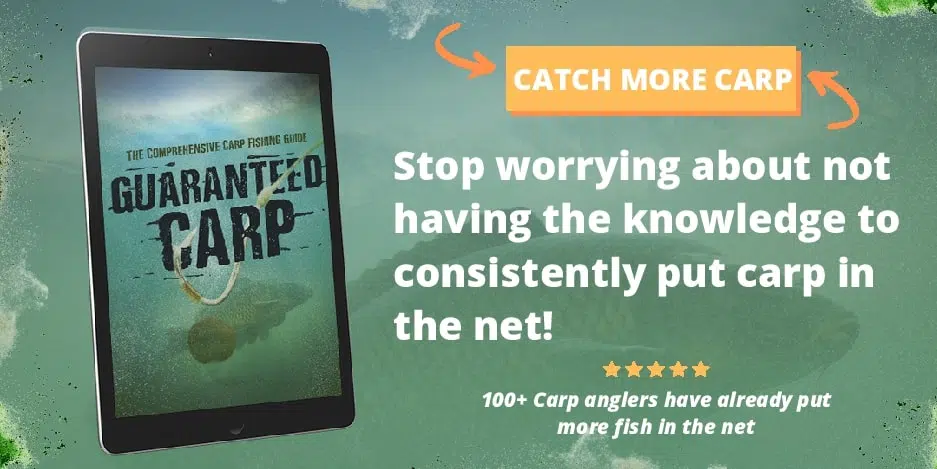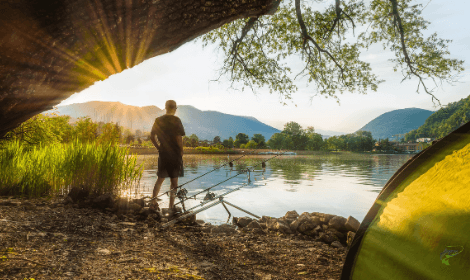
Different variations in the weather can affect carp fishing in different ways.
Let’s dive into the details of how weather affects carp so you can have an understanding of potential spikes in feeding activity or when feeding activity will be negatively impacted.
Does Weather Affect Carp Fishing?
As mentioned in the introduction briefly weather changes impact all fish species to some extent, not just carp.
As an angler, you can predict what the fishing conditions will be like for all species you fish for and not just carp alone.
Knowing that all species across the board will be impacted in essentially the same manner due to weather it’s important, as an angler, to know how to recognize and read these signs.
Weather can put carp into 3 feeding mood categories, these categories are Negative, Neutral, and positive, and based on what the weather is doing, you can give yourself a pretty good idea of what one they will be in before you even leave your house.
Atmospheric Pressure
Atmospheric pressure is the pressure exerted on the Earth at sea level and can be measured in a number of ways, from Bars, pascals, and inches.
In the case of this article and fishing in general the standard measurement is in inches or pounds per square inch.
Sorry to the majority of the world using the Metric system, but it’s actually in this case very straightforward and you don’t need an understanding of the standard measuring system, you only need to remember one or two numbers really.
In my and many anglers’ opinions, atmospheric pressure is one of the biggest weather considerations in terms of how the fish will behave on a given day.
The barometer is something I look at habitually almost every day at this point whether I’m fishing that day or not.
That’s because changes in atmospheric pressure can have good or bad consequences that can last for a couple of days.
The way I determine fish activity based on the atmospheric pressure is to imagine a horizontal line at 0.30 inches, if it’s at 30 or above and the barometer isn’t moving it’s going to most likely be a tough day and I would rather stay on the couch or in the pub in many cases.
Anything under 30 and it very well could be a different story, with pressure ranges in the 29-inch range typically being an indication of a low front or a potential weather system moving into the area.
If the barometer is showing movement, either in the upward or downward direction, get your gear and fly to your favorite fishing spot.
Any time the barometer shows strong movement it will typically mean that the fish have a serious case of the munchies.
Rain
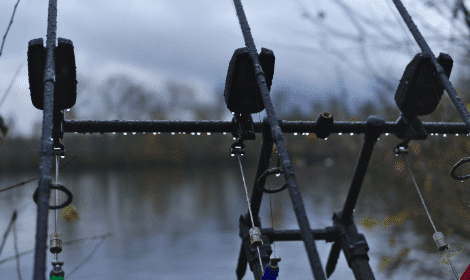
Rain can be very good for a positive carp feeding mood. Rain does many things that fish like carp like.
Increased Oxygen
One of the big factors to why rain is beneficial is oxygenation. Rain hits the surface of the water and air molecules mix into the water causing higher levels of oxygenation.
While this only happens in the top layer of a still body of water like a lake or pond it’s still beneficial simply due to the fact that the fish in a low front weather situation will likely be cruising and feeding in the shallower water or near the surface.
Organic Matter
Increasing water levels due to rain in rivers due to a summer storm will dislodge organic matter from the banks and allow other food such as insects and worms to wash into the river, creating a literal conveyor belt of food.
All the carp need to do is point themselves upstream and wait for food to come to them, or hang out in eddies and slack water as it accumulates from the current passing by.
On lakes and rivers, the carp will be near the banks during and after a deluge sucking up all kinds of snacks, so your best bet is to keep it close to the bank.
If you read our other post about what carp eat, you will find a section that talks about the tools a carp has at its disposal to find its dinner, and you will know that like many fish, carp aren’t sight feeders the vast majority of the time when it comes to finding their food.
What this means is if the water clarity gets bad from a large amount of run-off into a body of water, don’t let that deter you from fishing, all that run-off means food, and a carp could find a snail or your bait wearing a blindfold with ease.
Reduced Visibility
Through periods of heavy and prolonged rain a lot of water will make it’s way into carp ponds from the surrounding areas.
With this surface run off, the water can become extremely murky due to sediment running into the carp pond with the rain water.
A lot of people may see this as an issue, it would be with a lot of other fish species, but carp do not need to rely on their sight to feed.
As the waters become murky the fish will feel more secure and will begin to move around more freely in search of food that has been washed into the water.
Less Fishing Pressure
On wet days it can be guaranteed that a lot of anglers will stay in the house and avoid sitting on a soaking bank in the hunt of few fish.
To be honest, sometimes I don’t blame them. If you’re willing to get yourself out onto the bank on these less than pleasant days you could increase your chances of bagging a few extra fish on a quiet venue.
You will have the choice of the best pegs and the option to move around if things aren’t quite going to plan.
Less lines and baits in the water will also result in the carp feeling more comfortable and more inclined to feed.
Wind
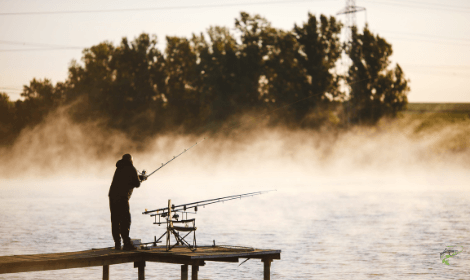
The wind is very similar to rain in some ways, but in other ways it’s can be different in terms of how it affects the fish.
My father always said, “wind from the east, the fish bite the least. Wind from the west the fish bite the best”. And to be completely honest he was right, well at least a majority of the time this old proverb would hold true.
That’s because the wind from the east or north for that matter typically happens after a cold front has blown through the area, leaving us with “post-frontal” conditions, and referring to the pressure section means a very high barometric pressure and fish in a lazy and negative mood and not feeding.
Wind from the south and west typically means that the barometer is stable and below 30 inches. Stable weather is conducive to normal feeding in the warm water months when fish have a high metabolism and eat frequently.
The wind has other benefits that translate into positive feeding moods. The wind blows organic matter and food up to the banks of a body of water, and fish like carp will gather there and hang out due to the ease of eating all this gathering food, it’s like a fish buffet.
What this means for you as an angler is you should pay attention to the wind as a habit like you should watch a barometer, regardless if you are fishing that day or not, and the reason for this is simple.
If the wind is blowing from the south for 3 days in a row, but the day you fish it switches to the west, you might think your favorite lake or pond will have carp stacked up on the eastern bank, but in reality, they are probably on the northern section of the lake due to the wind pushing food up onto the northern bank for the last 3 days and the carp are still there enjoying the buffet.
Temperature
Temperature is another incredible critical consideration when it comes to carp being in a positive or negative mood. This is because fish are cold-blooded, and their feeding goes hand in hand with temperature changes.
The warmer the water temperature gets the more fish feed, when the water temperature rises so does their blood temperature, boosting their metabolism, putting fish on the move, and feeding regularly.
The same is true with lower water temperatures, fish start slowing down and feeding less, but in some cases, colder temperatures can be a plus as long as its a slow and steady drop.
In the autumn when temperatures drop most fish start feeding aggressively to stock up their fat reserves for winter, and many carp anglers will tell you that October and autumn for that matter can be some of the best carp fishing there is.
Some people even believe that carp stop feeding altogether throughout the winter when the temperature drops but this just isn’t true. You can find out why in this post on carp feeding behaviours in winter.
If the temperature plummets sharply and in a small amount of time, this will negatively affect carps feeding mood. Due to factors such as the barometer climbing to high levels quickly due to high-pressure conditions as a result of a weather system, as well as needing to adjust to the temperature change as a result of being cold-blooded.
Spikes in temperature that result in warm water typically won’t affect carp as much negatively as cold temperatures. One consideration where it might be is if it was a brutal summer heatwave, which could cause a lack of dissolved oxygen, but carp typically can adapt to this easily.
Moon Phases
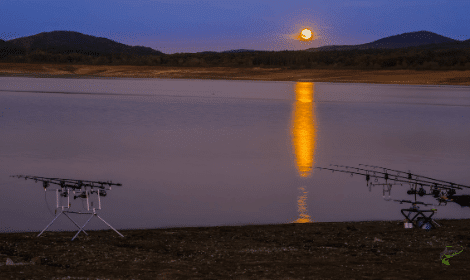
Out of all the conditions listed in this post, moon phases might very well be a trump card that cancels out any negative weather conditions. It’s the ace up your sleeve, the anglers version of blackmailing a fish, it’s… AWESOME!
Moon phases or in particular moonrise and moonset are huge positive feeding windows for all fish, including carp. These always change, by around an hour every day, so find yourself a solunar app for your phone or a chart to keep tabs on when they are on a given day.
I will give you my rule to success when it comes to fishing moonrise and moonset, which I guess aren’t actual phases, but still, listen up! Be at your best spot with bait in the water a half an hour before and after the exact time of these astronomical occurrences.
I can’t even tell you how many fish I have caught on the exact minute of moonrise and moonset, or within 5 minutes of either end of the exact time.
I personally have won 2 tournaments as a result of fishing a spot I knew held big fish at this time, and in my opinion moonrise and set are more powerful than the solar equivalent and they can work even in tough weather conditions when fish are in a negative mood for most of the day.
But actual moon phases that usually spike activity on the water as a whole would be between the new moon and a full moon.
Like moonrise and set there are also “major periods” that can spike fish activity.
These periods can last around two hours and are typically the other end from moonrise and set, literally being moon overhead and moon below.
While being called a “major” the exact time of these occurrences doesn’t seem to be as powerful as rising and setting in my humble opinion.
How these moon phases affect carp fishing may not be 100% factual. The debate has raged on for many year.
Find more on if carp are actually affected by the moon phases or not in this post.
Scenarios
In this section, I will give you some examples of what we mentioned throughout the article that happen regularly for us anglers and what I would personally do in them.
Scenario #1
You just got done at work, it’s a warm afternoon in mid-summer and the weather forecast shows a thunderstorm heading your way in 3 hours. What do you do?
Answer:
Quick! Grab your gear, run as quickly as you can away from your wife’s to-do list, and hit your favourite spot. As the storm approaches that barometer is going to move as fast as my car’s fuel gauge the day before payday. The fish will be feeding like crazy and chances are you’re going to have a flurry of activity.
Scenario #2
There’s a blue sky overhead, you stretch your sore back that’s sore from a combination of fighting multiple chunky carp the afternoon before when that storm came in, but also because your wife made you sleep on the couch because you didn’t even look at that list of things to do. Should you go fishing again?
Answer:
I mean all things considered, probably not. First, the barometer is probably stable and well over the 30-inch mark, and the bluebird sky after the summer storm is an indicator of that. The fish had their fill the day before, and are in a negative mood now, much like your wife. So it’s between the pub or the wife, your choice.
That’s All!
One of my fishing mentors was a wise elderly man who spent his entire life on the water, And he told me things that have stuck with me to this day.
“Fish don’t read”
What he meant was, you can read about when you should or shouldn’t go fishing on a particular day, or where the fish will be, or what you should use for bait or lures, but at the end of the day experience trumps all.
Even this article is a basic and general rule of a complex combination of idiosyncrasies and factors that don’t apply all the time every time.
I have had days where the fish should not have been active and were, and I’ve had days where all indications seemed to point towards a great day on the water, and it wasn’t.
It’s undeniable that these considerations on weather be taken into account to help you succeed more consistently on the water, but at the end of the day just get out and fish.

